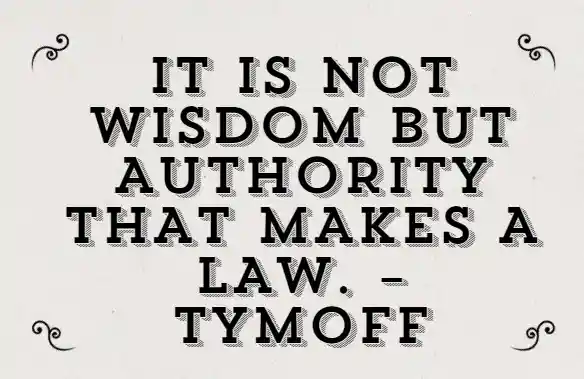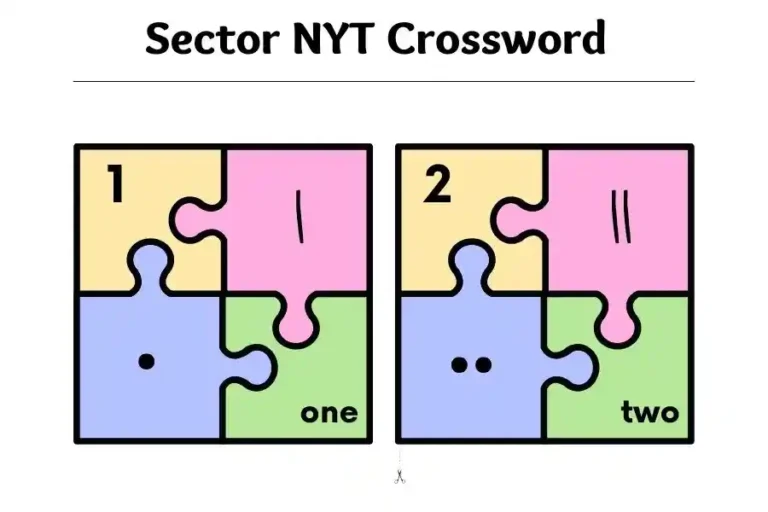It Is Not Wisdom But Authority That Makes a Law. – Tymoff
Ever pondered over the fine line between wisdom and authority? The age-old adage, “It is not wisdom but authority that makes a law,” has sparked debates and reflections for centuries. Laws are not just rules but a reflection of power dynamics and intellectual prowess. Let’s delve into the intriguing world of law-making, dissecting the roles of wisdom and authority in shaping our legal systems. We’ll explore the origins of this thought-provoking quote and its implications on society today.
Understanding the Quote
When we dissect the quote, “It Is Not Wisdom But Authority That Makes a Law. – Tymoff,” we confront a profound statement about governance. This phrase challenges us to consider whether laws are truly born out of thoughtful reasoning or simply imposed by those in power. Is it the intellectual acumen behind legislation that matters most, or the sheer force and influence wielded by authorities? This dichotomy forces us to question the legitimacy and effectiveness of our legal systems.
Historical Context and Origins
To understand the significance of this quote, we must explore its historical context and origins. Dating back to ancient civilizations like Mesopotamia and Egypt, laws were often established by rulers or authorities to maintain order and control within societies. These early legal systems heavily relied on authority figures’ commands rather than thoughtful deliberation or wisdom.
As societies evolved, thinkers like Plato and Aristotle began questioning the source of legitimacy in-laws. They pondered whether it was the wisdom behind legislation or simply the authoritative decree that shaped societal norms. Throughout history, we see examples where laws based solely on authority led to oppression and injustice while those rooted in wisdom promoted equity and progress.
The Role of Authority in Law-Making
Authority plays a significant role in the creation and enforcement of laws. It provides the framework within which laws are established, interpreted, and upheld. Without authority, laws would lack legitimacy and power to maintain order in society. Authorities such as governments, courts, and law enforcement agencies hold the responsibility of developing laws that reflect societal values and norms. Their ability to enforce these laws ensures compliance from individuals and organizations alike.
The authority vested in lawmakers allows them to make decisions on behalf of the population they represent. This authority is derived from various sources such as constitutions, statutes, judicial precedent, or administrative regulations. Without a centralized body with the power to create and enforce laws, chaos could ensue. The balance between granting authority to create laws while ensuring wisdom guides their implementation is essential for a just legal system.
The Impact of Wisdom on Effective Laws
Wisdom plays a crucial role in creating effective laws. When laws are crafted with wisdom, they reflect a deep understanding of societal needs and values. Wise lawmakers consider the long-term implications of their decisions, aiming to promote justice and fairness for all. Laws rooted in wisdom are more likely to stand the test of time, adapting to changing circumstances while upholding fundamental principles.
By integrating wisdom into law-making processes, legislators can address complex issues with nuance and foresight. Wisdom allows for thoughtful consideration of diverse perspectives, leading to more inclusive and equitable laws. It enables lawmakers to anticipate unintended consequences and mitigate potential harm before it occurs. The impact of wisdom on creating effective laws is profound; it shapes not only legal systems but also society as a whole.
Authority vs. Wisdom: Case Studies
When we consider laws created based on authority, one example that comes to mind is the implementation of strict penalties for specific offences. These laws rely on the power and control of those in authority to enforce compliance, often without considering the underlying reasons or consequences.
On the other hand, laws crafted with wisdom take into account societal values, ethical principles, and long-term implications. For instance, environmental protection regulations are often developed with a focus on sustainable practices and preserving natural resources for future generations.
While authority-based laws may seem efficient in maintaining order and obedience, they can sometimes overlook individual rights and fairness. In contrast, wise laws strive to balance justice with compassion and foresight. Examining these examples sheds light on the importance of finding a harmonious blend between authoritative enforcement and thoughtful consideration when shaping our legal systems.
Criticisms and Debates
Some critics argue that prioritizing authority over wisdom in law-making may lead to oppressive and unjust regulations. They believe that laws should reflect the collective wisdom of society rather than just being imposed by those in power. On the other hand, proponents of the quote emphasize the need for a structured hierarchy and clear enforcement mechanisms to maintain order within a society. They argue that without authoritative figures setting rules, chaos could ensue.
Debates often arise regarding who holds the authority to make laws and whether their decisions truly benefit the greater good. The balance between upholding authority while also considering wisdom remains a contentious issue among legal scholars and policymakers. Finding harmony between authority and wisdom is crucial in creating fair and effective laws that serve the best interests of all individuals within a community.
Balancing Authority and Wisdom in Law-Making
Striking a balance between authority and wisdom in law-making is essential for creating just and effective regulations. While authority provides the power to enforce laws, wisdom ensures that these laws are fair and beneficial to society as a whole. Lawmakers must consider both aspects when crafting legislation, drawing on their expertise while also seeking guidance from those with diverse perspectives.
By integrating authority with wisdom, laws can be more reflective of the values and needs of the people they serve. This approach allows for flexibility and adaptation in response to changing circumstances, fostering a legal system that evolves alongside society. Collaboration between authoritative figures and individuals with deep insights can lead to innovative solutions that address complex issues effectively.
The Role of Democracy in Ensuring Wise Law-Making
Democratic principles support balanced law-making by ensuring that authority and wisdom are both represented in the legislative process. Public participation and accountability are crucial in this regard. By voting, engaging in public discourse, and holding lawmakers accountable, citizens can ensure that their voices are heard and that laws reflect collective wisdom.
Democracies provide mechanisms for diverse perspectives to be considered in law-making, promoting inclusivity and equity. Transparency and accountability help to prevent abuses of power, ensuring that authority is exercised responsibly. In this way, democracy fosters a balanced approach to law-making that incorporates both authority and wisdom.
Technological Advancements and Modern Law-Making
Technology has a profound impact on the balance between authority and wisdom in modern law-making. Data and artificial intelligence (AI) can provide lawmakers with insights that enhance their decision-making processes. By analyzing vast amounts of data, AI can identify trends, predict outcomes, and suggest evidence-based solutions to complex issues.
Technology also enables greater public participation in the legislative process. Online platforms allow citizens to share their views, provide feedback, and engage in discussions about proposed laws. This increased transparency and engagement can help ensure that laws are both wise and reflective of societal values.
Ethical Considerations in Law-Making
Ensuring that laws are ethically sound is a critical aspect of law-making. Ethical wisdom involves considering the moral implications of laws and their impact on society. Laws should promote justice, protect rights, and enhance the well-being of all citizens.
By integrating ethical considerations into the legislative process, lawmakers can create laws that reflect the highest standards of fairness and integrity. Ethical wisdom helps to prevent abuses of power and ensures that laws serve the greater good.
Global Perspectives on Authority and Wisdom in Law-Making
A comparative analysis of different legal systems around the world can provide valuable insights into the balance between authority and wisdom in law-making. Some countries have successfully integrated both aspects into their legal frameworks, creating systems that are both effective and just.
For example, countries with strong democratic institutions often have mechanisms for public participation and accountability that promote wise law-making. By examining these examples, other nations can learn valuable lessons and adopt best practices to enhance their legal systems.
Future of Law-Making: Trends and Predictions
Emerging trends in law-making indicate a growing emphasis on integrating wisdom with authority. As societies become more complex, the need for thoughtful and nuanced legislation becomes increasingly important. Future law-making is likely to involve greater collaboration between diverse stakeholders, including experts, citizens, and technology.
Predictions for the future balance of authority and wisdom suggest a move towards more inclusive and transparent legislative processes. By leveraging technology and fostering public engagement, lawmakers can create laws that are both effective and reflective of societal values.
Conclusion
Finding a balance between authority and wisdom in law-making is essential for creating just and effective regulations. While authority provides the power to enforce laws, wisdom ensures that these laws are fair and beneficial to society as a whole. By integrating both aspects, lawmakers can create laws that uphold justice, promote equality, protect rights, and enhance the well-being of all citizens. You can also know about Envato Grammarly Canva Package by going through that link.
FAQs About It Is Not Wisdom But Authority That Makes a Law. – Tymoff
Can laws be effective if they are solely based on authority without wisdom?
A: While laws enforced through authority alone may maintain order, they might lack the depth and fairness that wisdom can provide. Striking a balance between authority and wisdom is crucial for creating just and effective laws.
Are there any famous examples of laws made based on authority rather than wisdom?
One example is authoritarian regimes that impose oppressive laws to control their populations. These laws prioritize power over justice or societal well-being.
How can individuals advocate for more wise and thoughtful law-making processes?
By participating in the democratic process, staying informed about current issues, supporting transparent governance, and holding policymakers accountable, individuals can push for wiser decision-making in law creation.
What role does public participation play in creating wise laws?
Public participation is crucial in ensuring that laws reflect collective wisdom. By engaging in public discourse, providing feedback, and voting, citizens can help shape laws that are fair and equitable.
How can technology enhance the wisdom in law-making?
Technology can provide lawmakers with data-driven insights and facilitate greater public participation. By leveraging AI and online platforms, lawmakers can make more informed decisions and create laws that better reflect societal needs.







One Comment